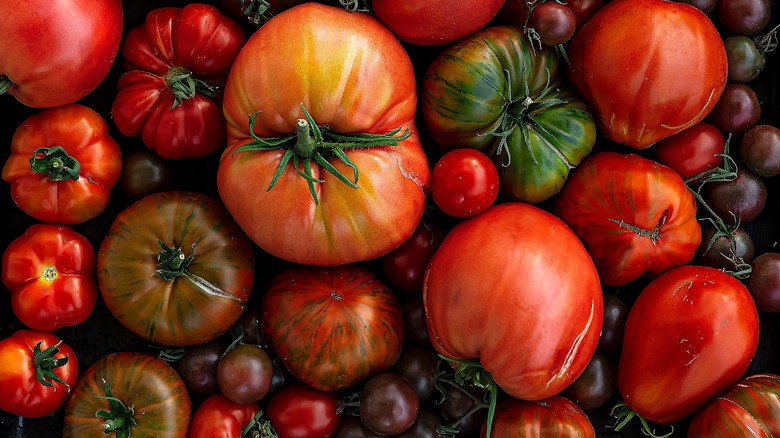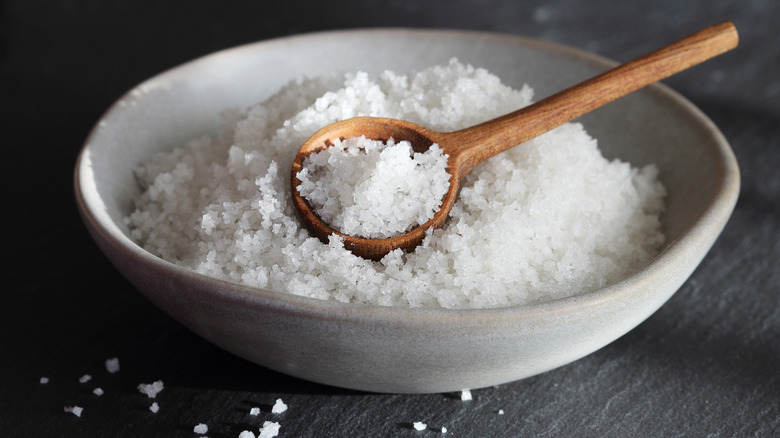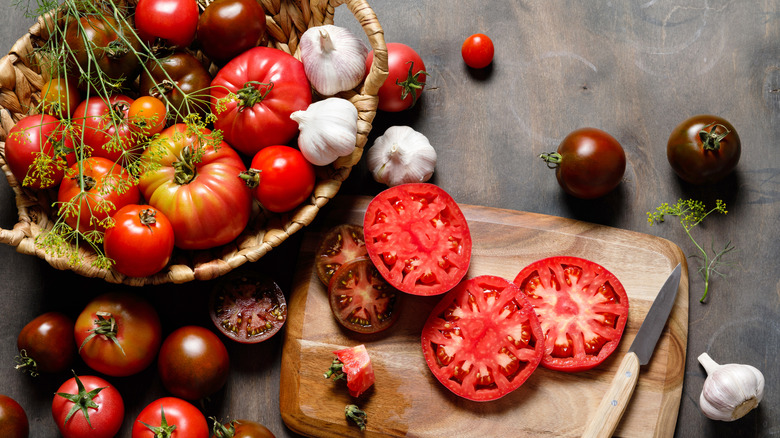The Science Of Why Salting Tomatoes Is So Important
A great tomato is one of the most wonderful things in this world, but a bad tomato is among the most disappointing. The good ones are smooth, juicy, and packed to the brim with rich umami flavor while the lousy ones are often mealy and watery. If you want a really great tomato, you'll have to look for them in-season, which, according to Food Network, lasts from late spring to early autumn, varying a bit depending on your exact location. Unfortunately, finding great tomatoes out of season is a tall order, which means no delicious Caprese salad or delectable BLTs for half the year. But what if there were a way to make bad tomatoes good, and good tomatoes even better?
Such magical things are possible with the aid of one secret ingredient: salt. Yep, that's it. Salt is the most important ingredient in your kitchen, but we wouldn't blame you for thinking it's a little bit boring. Once you get to know salt a bit better, however, you'll realize that it's possibly the coolest ingredient in the world. For starters, salt is the only inorganic substance we eat (via CBC). We crave it because it is absolutely vital to survival, helping to power our minds and muscles. When it comes to cooking, salt does things no other ingredient can do — things so incredible that calling it a "seasoning" almost feels like an understatement.
Why salt is different than other seasonings
Most seasonings are used with one clear purpose in mind: to add that ingredient's unique flavor to your dish. Salt is different. Yes, it adds saltiness to your food, but that's just the tip of the iceberg. The Guardian explains that salt can also reduce bitterness, enhance sweetness, and amplify aromas. Scientists are not entirely sure how salt manages to suppress bitter flavors, but it's widely believed that sodium ions affect the bitter receptors on our tongues to make them less sensitive. In doing so, salt also enhances sweet and savory flavors that are easily overwhelmed by the presence of bitterness. That's why some people like to add a tiny pinch of salt to bitter items like grapefruit or coffee, to help bring out other flavors.
Interestingly enough, salt can also ensure that sweet foods do not become overly cloying. Bon Appétit claims that "every dessert" needs salt. Its main purpose is balancing flavors. We also need to touch on the aromatic power of salt, which might surprise you since it is not particularly fragrant on its own. According to The Guardian, when you put salt on a moist surface, such as the flesh of a fruit, it draws out the volatile chemicals responsible for aromas. Smell and taste go hand-in-hand (in fact, the Exploratorium estimates that 80-90% of what we perceive as taste is the direct result of aroma), so drawing out more aromatic compounds should make your food more flavorful.
Salt amplifies the taste of tomatoes
The fact that salt can draw out flavorful compounds is exactly why it's such a perfect partner for raw tomatoes. According to Serious Eats, the secret lies in the fact that salt triggers osmosis, pulling the tomato's juices out of its cells. These juices are predominantly composed of water, and a common complaint about bad tomatoes is that they taste too watery. Bon Appétit explains that, by using salt to draw excess water out of the fruit, you're actually intensifying the tomato's natural flavor. Salt's ability to reduce bitterness also comes into play here because it will amplify the sweetness of the tomatoes, which is what you're really looking to enhance. To quote Bon Appétit senior food editor Molly Baz, "Salt makes food taste more like itself."
There's another way that salt enhances flavor that has nothing to do with the food itself. Serious Eats notes that "salt stimulates [our] salivary glands," filling our mouths with saliva, which helps to distribute flavor to all of our taste buds. Delicious, and a bit gross! So, next time you're cooking with fresh tomatoes, try boosting them with a pinch of salt. If you're preparing tomatoes more than 15 minutes before you plan to eat them, Serious Eats suggests using kosher salt (about a teaspoon per pound of tomatoes) and straining the juice out for another use. If you're going to eat the tomato right then and there, try a pinch of flaky sea salt instead.


